FIRST: A DISPIRITED REFLECTION AND A SOBER REVIEW OF OUR EFFORTS
Many times over the years at BookNotes I have listed books that might help Christian people think faithfully, Biblically, and well about politics and citizenship. Those lists have never generated many sales and for decades, now, I have carried a burden that I have failed at my own calling to help contribute to the development of the Christian mind on politics. There are so many good books from many different angles but they just don’t sell.
I have written essays and suggested books and have promoted significant and thoughtful resources about statecraft and government and citizenship such as, just for instance, God and the Constitution: Christianity and American Politics by Paul Marshall (Rowman & Littlefield; $27.95) which is less about the constitution, as such, and more just a fine introductory book about a Christian political vision. For years it was my “go to” book, even though it is hardback and pricey.
I have repeatedly recommended James Skillen’s major work called The Good of Politics: A Biblical, Historical, and Contemporary Introduction (Baker Academic; $24.00) which highlights and evaluates the history of various church leaders who have helped us think about the proper role of the state and guiding us towards reasonable, faithful principles for public life in a pluralistic democracy. Wanting to be somehow Biblical and not accommodated to worldly thought isn’t a new project, of course, and our best theologians throughout church history have taught about matters relating to the state’s task and our duty as citizens.
Our BookNotes newsletter has for years and years reminded readers about the thoughtful and theologically rich method for thinking about political policies found in Ronald J. Sider’s excellent book Just Politics: A Guide for Christian Engagement (Brazos Press; $22.00.) I think it is one of the most careful and helpful books to truly guide us well into thinking Christianly about policy choices.
Over the years I have touted the
historic resource put out by the National Association for Evangelicals
in 2005 after years of study and reflection called Toward an Evangelical Public Policy: Political Strategies for the Health of the Nation, a
remarkably thoughtful, diverse collection of essays of public theology
from the likes of David Gushee, Max Stackhouse, Paul Marshall, Nicholas
Wolterstorff and others, reflecting upon the NAE “For the Health of the
Nation” document. That big book is edited by Ronald J. Sider and the
late Diane Knippers (Baker Academic; $24.00.) With scholars who tend
more conservative, politically, and some more in other directions, they
all bring deep and thoughtful consideration to bear in what is a model
of thoughtfully Christian proposals. Many of the current evangelicals
speaking out these days seem shallow, strident, and ill-informed about
what the Bible actually says about social concerns in comparison. Alas,
the book is hardly known, I’m afraid, and we sit on bunches here in
Dallastown.
Such books honor Christ by attempting to be judiciously Biblical and balanced, without too much loyalty to either major party or their respective worldviews, and offering nuance and insight — not knee jerk reaction to this or that hot button issue. These books help us get first things first, seeing how the gospel might point us to principles that make for healthy public life and guide us in faithful citizenship. They avoid stuff like the foolish irresponsibility of Wayne Grudem’s right-wing tax policy proposal inspired, literally, by one half of one Proverb in his thick book on politics, and attempt to offer a more thorough and consistently Biblical perspective.
Often I have invited folks to the deeper study of why Christians should not be ideologically committed to the far right or far left (since both have their intellectual and spiritual roots in the secularized ideologies of the Enlightenment) as explained in stunning intellectual works such as Political Visions & Illusions: A Survey & Christian Critique of Contemporary Ideologies by David Koyzis (IVP; $27.00.) Not everyone agrees with his radical critique of left and right — maybe it depends on whose ox is gored — and I suppose not everyone even agrees that Christians are obligated to be “non conformed” to the ways of the political world by refusing the assumptions of worldly ideologies (for my take, see Colossians 2:8, 2 Corinthians 10:5, or Romans 12:1-2.) In any event, Koyzis book is deep and serious.
Beth and I went to some expense to host a public lecture in Pittsburgh a year and a half ago with our friend Dr. Vincent Bacote where we celebrated the esteemed Wheaton professors simple guide to public faith, the handy and wise The Political Disciple: A Theology of Public Life (Zondervan; $11.99.) What a great little resource that is! See my comments here.
I even have a blurb on the back of the paperback edition of Miroslav Volf’s A Public Faith: How Followers of Christ Should Serve the Common Good (Brazos Press; $19.99) –– what an honor to get to endorse such an esteemed global leader. Nonetheless, we just haven’t been able to sell many. His latest on this topic, by the way, is Public Faith in Action: How to Think Carefully, Engage Wisely, and Vote with Integrity co-written with Ryan McAnnally-Linz (Brazos Press; $21.99.)
I hope you saw my long review this past summer of Five Views on the Church and Politics a fabulous new book highlighting how different faith traditions — Lutheran, Catholic, Reformed, Anabaptist and historic black church — relate faith and politics which is delightfully edited by Amy Black (Zondervan; $19.99.) In a way, it is similar to a book I’ve touted for a decade, Church, State and Public Justice: Five Views edited by P.C. Kemeny (IVP Academic; $22.00) which also has a hefty dialogue back and forth between five scholars who agree we must “integrate” faith and politics with a faithful, Biblical view, but who disagree with how that is done, what the task of the state is, and what that looks like in political life.
Even more simple and feisty and fun (and therefore both more accessible but, I think, less useful in the long run since it just has two views) is Left, Right & Christ: Evangelical Faith in Politics a dialogue between Lisa Sharon Harper and D.C. Innes (Elevate Faith; $19.99.) A bit more nuanced with more varied perspectives is the great collection offering a lot of views, showing how good people who are Christ-followers can disagree agreeably called Evangelicals on Public Policy Issues: Sustaining a Respectful Political Conversation edited by Harold Heie (Leafwood Publishing/Abilene Christian University Press; $17.99.) I’ve mentioned it often and oh how I wish more had been bought, studied, and that readers learned to model this kind of wholesome, principled conversation and political discourse.
I guess this line of thinking — an invitation to be responsible, “in but not of” the world, thinking faithfully, developing normative principles for our citizenship, presented with grace — isn’t as captivating for most church folks as I figure it should be. Or maybe some readers just feel too overwhelmed to read such things, or want to get practical, reading books about activism and causes. (We don’t sell many of those kind, either, but that’s another worry for another day.) Perhaps many folks surmise, somehow, that they can intuit their way into a distinctively Biblical approach without help from Christian scholars of political science or reading and discussing the sorts of resources we plead with folks to read. I suppose that’s plausible.
THE CHRISTIAN MIND
Besides listing books about faith and politics, we’ve made the previous case that good books help us develop the Christian mind, that our theories about things must be reformed by intentional Christian scholarship done in the light of the Word, which is to be a light before our path, also in our thinking about things like government, public life, citizenship, law, war, taxes, and the like. How many times have we stood up at conferences and gatherings sharing our enthusiasm for the life-transforming 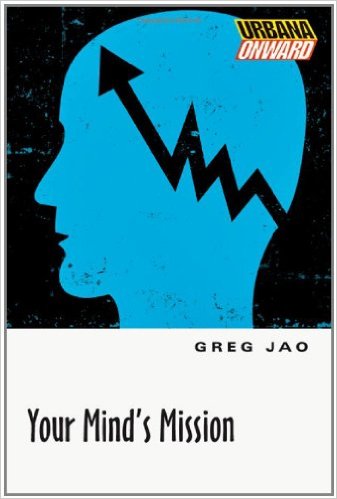 power of little books like Greg Jao’s Your Minds Mission or James Sire’s Discipleship of the Mind and Habits of the Mind? We’ve spend decades promoting books to help us think about our social and political and economic duties corem deo by recommending titles such as Brian Walsh & Richard Middleton’s book called The Transforming Vision or Al Wolter’s Creation Regained or even Robert Webber’s classic The Secular Saint: A Case for Evangelical Social Responsibility. Speaking of classics, might we revisit even Richard Niebuhr’s Christ and Culture? It is little wonder we don’t have a lot of bookstores selling a lot of books about, say, faithfully considered Christian views of politics, because we don’t have much interest in developing a radical Christian mind. We have Christian theology and morality and worship and prayer, but — like that famous book from the early 1960s called The Christian Mind by C.S. Lewis’s friend Harry Blamires put it, “we don’t have a Christian mind.” Although much has changed since Mark Noll’s critical assessment in 1994s The Scandal of the Evangelical Mind, the lack of a consensus about Christian political principles, on such horrid display this year, I have this sense that his word is still needed. No wonder when I say we shouldn’t accommodate ourselves necessarily to a right wing or left wing agenda, people look at me like I’m talking nonsense. And no wonder hardly anybody buys the books I suggest on these kinds of topics.
power of little books like Greg Jao’s Your Minds Mission or James Sire’s Discipleship of the Mind and Habits of the Mind? We’ve spend decades promoting books to help us think about our social and political and economic duties corem deo by recommending titles such as Brian Walsh & Richard Middleton’s book called The Transforming Vision or Al Wolter’s Creation Regained or even Robert Webber’s classic The Secular Saint: A Case for Evangelical Social Responsibility. Speaking of classics, might we revisit even Richard Niebuhr’s Christ and Culture? It is little wonder we don’t have a lot of bookstores selling a lot of books about, say, faithfully considered Christian views of politics, because we don’t have much interest in developing a radical Christian mind. We have Christian theology and morality and worship and prayer, but — like that famous book from the early 1960s called The Christian Mind by C.S. Lewis’s friend Harry Blamires put it, “we don’t have a Christian mind.” Although much has changed since Mark Noll’s critical assessment in 1994s The Scandal of the Evangelical Mind, the lack of a consensus about Christian political principles, on such horrid display this year, I have this sense that his word is still needed. No wonder when I say we shouldn’t accommodate ourselves necessarily to a right wing or left wing agenda, people look at me like I’m talking nonsense. And no wonder hardly anybody buys the books I suggest on these kinds of topics.
It just seems to me — please forgive me if I seem disgruntled or judgmental — that the evangelicals who are so loud for Mr. Trump or those who seem so happy with Hillary, haven’t been paying attention to these kinds of books, taking cues about faithful citizenship from our best Christian political writers and advocates. Good people can disagree about much, but vivacious, unqualified support for vile candidates who don’t talk about public justice or the common good seems to me a huge, huge failing.
DEEPLY DEPRESSED
On the eve of this election I am deeply depressed, as many of you are, but feeling a bit of a particular burden, that if only more folks within the Body of Christ had taken up more intentional conversations about these kinds of things in light of the best public intellectuals and Christian writers who are not themselves accommodated to the right or the left — those who are brave and faithful enough to say no to secular ideologies and pioneer some third way — we may not be quite in the mess we are in now.
I am sad, just for instance, that in our own area a group of so-called Bible believing pastors have gathered to encourage one another in their social and public witness — by which they seem to mean their work for Donald Trump — and I suspect not a one of them have read a single responsible book about a truly mature Christian political perspective. They get written up in the paper as some sort of admirable fellowship and I am embarrassed for the Body of Christ to see brothers so in bed with corruption in what seems to me to be crass idolatry and pastoral malpractice. Perhaps they have thought it through more than it seems, maybe they’ve read widely and earned the right to call their press conference and lead their flocks in this, but I doubt it. I do not know what other theological booksellers have done throughout the country but I do not think the best Christian books have been widely read or significantly applied. I feel like a failure tonight, and wish I had tried harder to sell better books more widely.
So, yes, I feel badly, sitting as we are on piles of great resources that might have helped deepen the conversation about faith and politics these past years. And now, with a poor candidate on one hand and what I think is an evil one on the other, and many folks I know deeply aligned with one or the other, and many more of us wondering what to do, we are facing a very, very hard cultural moment.
I assume you feel anxious about this too.
BOOKS TO READ IN THIS DIFFICULT SEASON
LAMENT, CIVILITY, COMMUNITY, RECONCILIATION, HOPE
Here are more than a dozen book suggestions that might be useful to read this next week or so. I invite you to order one or two for your own spiritual sanity and perhaps to use with others to deepen our conversations in these times. There are others, of course — give us a call if we can serve you further.
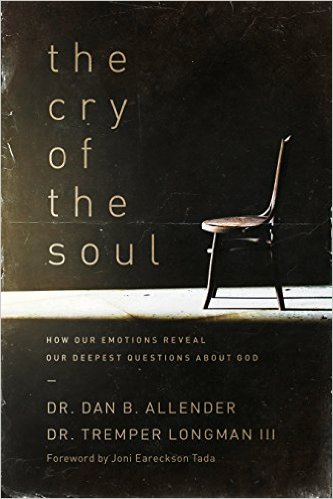 The Cry of the Soul: How Our Emotions Reveal Our Deepest Questions about God Dan Allender & Tremper Longman III (NavPress) $16.99 I certainly hope you know this dynamic duo who often co-write books together. Allender is a respected, moving, thoughtful psychologist while Longman is surely one of the best Old Testament scholars writing today. Here, they join up to explore how the Bible itself authorizes us to embrace our negative emotions and how the Scriptures themselves, especially the Psalms, can help us not only name, discern, and value our hard feelings and dark desires (anger, worry, fear, despair, and the like) but how they can reveal truths to us about God and God’s faithfulness and redemptive work in our lives. In a way, this is an excellent book for anyone, anytime, about opening up the emotional side of life or, put another way, about being more deeply spiritual as we walk with God in our rawest aspects of our humanity. So is it self-helpy psychology or Biblical spirituality? I’d say it is both. The Cry of the Soul is a life-line for those who are hurting, distressed, anxious, wanting tools to learn how to handle our pain in light of solid Bible teaching.
The Cry of the Soul: How Our Emotions Reveal Our Deepest Questions about God Dan Allender & Tremper Longman III (NavPress) $16.99 I certainly hope you know this dynamic duo who often co-write books together. Allender is a respected, moving, thoughtful psychologist while Longman is surely one of the best Old Testament scholars writing today. Here, they join up to explore how the Bible itself authorizes us to embrace our negative emotions and how the Scriptures themselves, especially the Psalms, can help us not only name, discern, and value our hard feelings and dark desires (anger, worry, fear, despair, and the like) but how they can reveal truths to us about God and God’s faithfulness and redemptive work in our lives. In a way, this is an excellent book for anyone, anytime, about opening up the emotional side of life or, put another way, about being more deeply spiritual as we walk with God in our rawest aspects of our humanity. So is it self-helpy psychology or Biblical spirituality? I’d say it is both. The Cry of the Soul is a life-line for those who are hurting, distressed, anxious, wanting tools to learn how to handle our pain in light of solid Bible teaching.
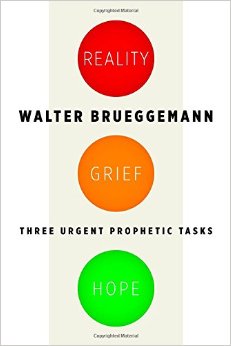 Reality, Grief, Hope: Three Urgent Prophetic Tasks Walter Brueggemann (Eerdmans) $15.00 This is the long, long-awaited sequel to Brueggemann’s most beloved books, The Prophetic Imagination and The Hopeful Imagination. Published in 2014, it deserves to be read and re-read, I think, as it points us in his deep, eloquent prose, to these three profound human tasks, tasks we must take up as Christians if we are to be faithful agents of God’s coming regime. To name reality as it is, to grief it well, and then — but only then — to proclaim gospel hope, these are what Brueggemann incisively explores. As only he can, he draws connections between the post-9/11 world and the destruction of ancient Jerusalem. We simply must name and understand the catastrophe of our times. This is how we can escape “the deathliness of denial and despair.”
Reality, Grief, Hope: Three Urgent Prophetic Tasks Walter Brueggemann (Eerdmans) $15.00 This is the long, long-awaited sequel to Brueggemann’s most beloved books, The Prophetic Imagination and The Hopeful Imagination. Published in 2014, it deserves to be read and re-read, I think, as it points us in his deep, eloquent prose, to these three profound human tasks, tasks we must take up as Christians if we are to be faithful agents of God’s coming regime. To name reality as it is, to grief it well, and then — but only then — to proclaim gospel hope, these are what Brueggemann incisively explores. As only he can, he draws connections between the post-9/11 world and the destruction of ancient Jerusalem. We simply must name and understand the catastrophe of our times. This is how we can escape “the deathliness of denial and despair.”
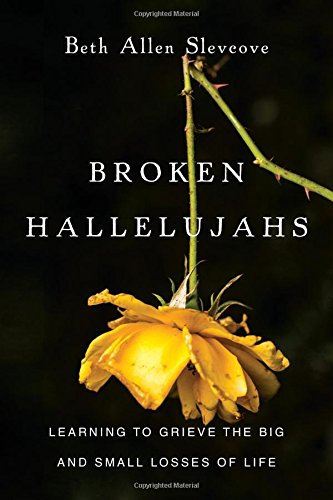 Broken Hallelujahs: Learning to Grieve the Big and Small Losses of Life Beth Allen Slevcove (IVP) $16.00 I suppose this Lutheran spiritual director and social activist doesn’t have “losing an election” or “despair that the other side’s candidate won” as one of the grieves she guides us through, but there’s a whole lot that comes close. This amazing book is part memoir, part spiritual formation, part a raw and real guide into faith amidst hard times. In each chapter the author tells of a particular sort of loss — some really large and looming, others maybe a bit less heavy — and then offers a spiritual practice designed to help us process, cope, and heal from this “broken hallelujah.” (I suppose you know the Leonard Cohen allusion.) I agree with Tod Bolsinger who says “Beth asks and attends to the hardest questions of life and faith with candor, courage, vulnerability and a wit that will make you sigh deeply and smile amidst your tears. This is a simply splendid book.” As she narrates her own losses, you will relate. As she offers distinctive spiritual practices you can find renewal in your faith and joy, even as you discover hidden beauty in these dark days. Highly recommended.
Broken Hallelujahs: Learning to Grieve the Big and Small Losses of Life Beth Allen Slevcove (IVP) $16.00 I suppose this Lutheran spiritual director and social activist doesn’t have “losing an election” or “despair that the other side’s candidate won” as one of the grieves she guides us through, but there’s a whole lot that comes close. This amazing book is part memoir, part spiritual formation, part a raw and real guide into faith amidst hard times. In each chapter the author tells of a particular sort of loss — some really large and looming, others maybe a bit less heavy — and then offers a spiritual practice designed to help us process, cope, and heal from this “broken hallelujah.” (I suppose you know the Leonard Cohen allusion.) I agree with Tod Bolsinger who says “Beth asks and attends to the hardest questions of life and faith with candor, courage, vulnerability and a wit that will make you sigh deeply and smile amidst your tears. This is a simply splendid book.” As she narrates her own losses, you will relate. As she offers distinctive spiritual practices you can find renewal in your faith and joy, even as you discover hidden beauty in these dark days. Highly recommended.
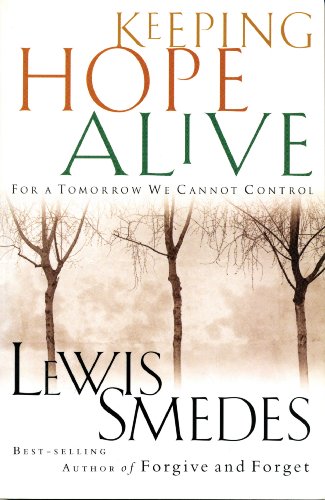 Keeping Hope Alive: For a Tomorrow We Cannot Control Lewis Smedes (Thomas Nelson) $14.99 Before his death a decade ago Lew Smedes was one of the writers who had this remarkable knack of using his impressive theological training to inform popular level writing that was pitched to ordinary folks. (Think, of instance, of his must-read, beautifully written best-selling book Forgive and Forget.) Smedes went to Calvin College as a young man, studied theology, and became a beloved professor of ethics at Fuller Theological Seminary. Near the end of his life he was so taken with God’s grace and goodness that it just spilled out in lovely prose, inspiring, insightful, wise, profound, but always delightful and well crafted. This is one of the better books on hope I’ve ever read and every day when I see it on our shelves I think of how I should read it again. Over 15 years ago he worried about the fearful age and the “doom and gloomers” who predicted calamity, the “fearmongers try to get us to hedge our bets on the future.” Ahh, here’s a man who believed the promises of God about Christ’s Kingdom coming and how we can run with joy into His reign.
Keeping Hope Alive: For a Tomorrow We Cannot Control Lewis Smedes (Thomas Nelson) $14.99 Before his death a decade ago Lew Smedes was one of the writers who had this remarkable knack of using his impressive theological training to inform popular level writing that was pitched to ordinary folks. (Think, of instance, of his must-read, beautifully written best-selling book Forgive and Forget.) Smedes went to Calvin College as a young man, studied theology, and became a beloved professor of ethics at Fuller Theological Seminary. Near the end of his life he was so taken with God’s grace and goodness that it just spilled out in lovely prose, inspiring, insightful, wise, profound, but always delightful and well crafted. This is one of the better books on hope I’ve ever read and every day when I see it on our shelves I think of how I should read it again. Over 15 years ago he worried about the fearful age and the “doom and gloomers” who predicted calamity, the “fearmongers try to get us to hedge our bets on the future.” Ahh, here’s a man who believed the promises of God about Christ’s Kingdom coming and how we can run with joy into His reign.
In Keeping Hope Alive, Lew Smedes helps us sort through different kinds of hope, though, but insists it is vital. As he put it, “Hope is as native to our spirits
as thinking is to our brain. Keep hoping, and you keep living. Stop
hoping, and you start dying.“
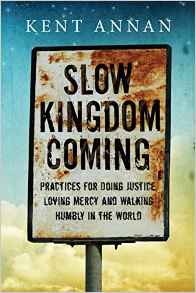 Slow Kingdom Coming: Practices for Doing Justice, Loving Mercy and Walking Humbly in the World Kent Annan (IVP) $16.00 Kent has faced heartbreak and struggle in his work among the poor in Haiti. He has written passionately about social change, about wholistic mission, about God’s care for public justice. Here he gives us a beautiful, helpful, extended meditation on the virtues of Micah 6:8, how to keep on keeping on. This is hard work and regardless of your own partisan loyalties, I trust you desire to be shaped by this kind of spirituality.
Slow Kingdom Coming: Practices for Doing Justice, Loving Mercy and Walking Humbly in the World Kent Annan (IVP) $16.00 Kent has faced heartbreak and struggle in his work among the poor in Haiti. He has written passionately about social change, about wholistic mission, about God’s care for public justice. Here he gives us a beautiful, helpful, extended meditation on the virtues of Micah 6:8, how to keep on keeping on. This is hard work and regardless of your own partisan loyalties, I trust you desire to be shaped by this kind of spirituality.
Many have raved about this book, but this is blurb by Shane Clairborne is spot on:
“Kent Annan is doing some of the most redemptive work on the planet. His
newest book is a breath of fresh air he steps back from all the action
to consider the practices, prayer and disciplined reflection that
sustains the work of justice. Slow Kingdom Coming is about going slow in
a fast world, going deep in a shallow world and going far in a world
that likes shortcuts. Brilliant.”
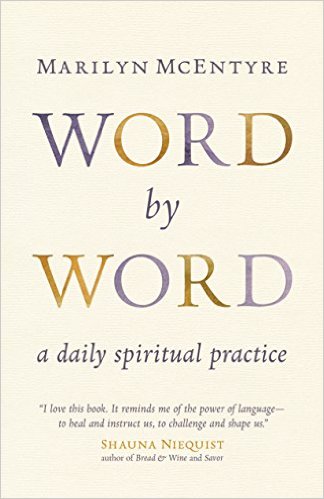 Word By Word: A Daily Spiritual Practice Marilyn McEntyre (Eerdmans) $17.99 I have been working on a longer review of this marvelous new book by one of my favorite writers but wanted very badly to include it here, now, so I will be more brief that this wonderful work deserves. You may know that her Caring for Words in a Culture of Lies is one of my all time favorite books ever (and an exceptionally useful book for these days as well!)
Word By Word: A Daily Spiritual Practice Marilyn McEntyre (Eerdmans) $17.99 I have been working on a longer review of this marvelous new book by one of my favorite writers but wanted very badly to include it here, now, so I will be more brief that this wonderful work deserves. You may know that her Caring for Words in a Culture of Lies is one of my all time favorite books ever (and an exceptionally useful book for these days as well!)
Marilyn McEntyre’s new book is in the genre that we sometimes call a devotional, but rather than reflecting on a Bible passage, it is a Christian reflection on words and phrases. As Shauna Niequist puts it, “I love this book. It reminds me of the power of language — to heal and instruct us, to challenge and shape us.”
I think in these days of hard and even hurtful conversations, we need to ponder our use of words, our language. Although this is not a book overtly about conflict resolution or being a better communicator, it does, in allusive ways, helps us care more about our words. She invites us to savor fifteen specific words — listen, receive, enjoy, accept, leave, ask, welcome — and some phrases: let go, be still. Marilyn is a poet, a serious reader, a thoughtful student of linguistic and literature, so having her help us dwell with these words is a great, good gift.
As Marilyn herself puts it in the introduction,
I invite you to discover, as I have, to my lasting delight, how words may become little fountains of grace. How a single word may, if you hold it for a while, become a prayer.
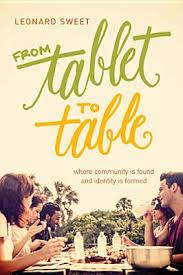 From Tablet to Table: Where Community is Found and Identity is Formed Leonard Sweet (NavPress) $14.99 Speaking of potent little books that are fun to read and yet stretching. The Rev. Len Sweet is a master storyteller, drawing on literature and science and statistics and quotes he finds who knows where — making him always a fascinating, upbeat, captivating author. In this book he takes a hard look at our “tablets” and face-down habits of staring at cell phones and invites us to get back to face-to-face fellowship. He does this by studying food, table habits, inviting us to real meals that can change our lives. Food is obviously mentioned from the beginning to the end of the Bible and Biblical folk should be attention to the theology and spirituality of eating. I like how he so winsomely calls us to notice our neighbors, to be hospitable, to care about real people in real time, and to take up the gift of fellowship by eating meals together. Can this change the world? I don’t know, but it is a start, a healthy practice, which — in Sweet’s telling — causes us to pay more attention to the storied nature of the gospel, and to tell stories of our own lives. In the second part he talks about setting the table at home, in church, and in the world. It’s supper time, ya’ll.
From Tablet to Table: Where Community is Found and Identity is Formed Leonard Sweet (NavPress) $14.99 Speaking of potent little books that are fun to read and yet stretching. The Rev. Len Sweet is a master storyteller, drawing on literature and science and statistics and quotes he finds who knows where — making him always a fascinating, upbeat, captivating author. In this book he takes a hard look at our “tablets” and face-down habits of staring at cell phones and invites us to get back to face-to-face fellowship. He does this by studying food, table habits, inviting us to real meals that can change our lives. Food is obviously mentioned from the beginning to the end of the Bible and Biblical folk should be attention to the theology and spirituality of eating. I like how he so winsomely calls us to notice our neighbors, to be hospitable, to care about real people in real time, and to take up the gift of fellowship by eating meals together. Can this change the world? I don’t know, but it is a start, a healthy practice, which — in Sweet’s telling — causes us to pay more attention to the storied nature of the gospel, and to tell stories of our own lives. In the second part he talks about setting the table at home, in church, and in the world. It’s supper time, ya’ll.
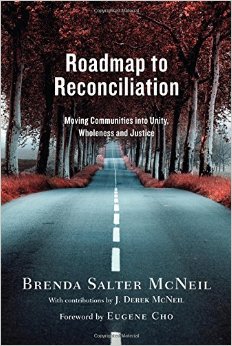 Roadmap to Reconciliation: Moving Communities Into Unity, Wholeness and Justice Brenda Salter McNeil (IVP) $16.00 This slim hardback is worth every penny, a great bargain for a beautiful, powerful book that can help us resist injustice through deep, gospel-centered work. Again, no matter who wins this election, we simply must continue to talk about race in America and focus on local efforts at bridging gaps, creating community, working with those who feel marginalized and those who are oppressed. Brenda is a passionate evangelist and social justice worker and this guidebook helps us take deeper steps into this hard, vital, blessed work. I do hope there are conversation about this topic at every fellowship group, campus ministry, church and nonprofit reading this. I’m sure this book will help — it is honest, hard, but yet a joy to see how God might work. It is so very useful, we’re eager to continue to tell you about it. Highly recommended.
Roadmap to Reconciliation: Moving Communities Into Unity, Wholeness and Justice Brenda Salter McNeil (IVP) $16.00 This slim hardback is worth every penny, a great bargain for a beautiful, powerful book that can help us resist injustice through deep, gospel-centered work. Again, no matter who wins this election, we simply must continue to talk about race in America and focus on local efforts at bridging gaps, creating community, working with those who feel marginalized and those who are oppressed. Brenda is a passionate evangelist and social justice worker and this guidebook helps us take deeper steps into this hard, vital, blessed work. I do hope there are conversation about this topic at every fellowship group, campus ministry, church and nonprofit reading this. I’m sure this book will help — it is honest, hard, but yet a joy to see how God might work. It is so very useful, we’re eager to continue to tell you about it. Highly recommended.
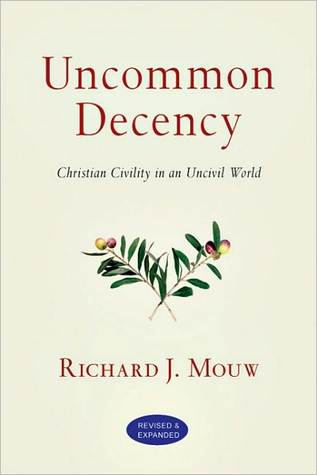 Uncommon Decency: Christian Civility in an Uncivil World Richard Mouw (IVP) $16.00 Yes, once more, I’ll tout this lovely, wise, enjoyable book which challenges us to inner civility, graciousness, learning to become the sort of people that know how to be kind in our debating, gracious in our public life, knowing how to navigate diverse views in personal arenas and in public. It is one of my top ten favorites of all time and I recommend it often. It really is so very, very good, I hope you’ll consider it, now more than ever. These conversations we’re having in our culture about ethnics, sexuality, politics, religion, theology, in our families, churches, and in the public square need to be conducted by those with what Mouw calls — borrowing a phrase from Marty Martin — convicted civility. See also his remarkable, brand new memoir about his own intellectual journey as an evangelical, Reformed public intellectual seeking common ground with others called Adventures in Evangelical Civility: A Lifelong Quest for Common Ground (Brazos Press; $24.99.) I will write more about it later but it is clearly one of my picks for best books of 2016. I mentioned it in the previous BookNotes.
Uncommon Decency: Christian Civility in an Uncivil World Richard Mouw (IVP) $16.00 Yes, once more, I’ll tout this lovely, wise, enjoyable book which challenges us to inner civility, graciousness, learning to become the sort of people that know how to be kind in our debating, gracious in our public life, knowing how to navigate diverse views in personal arenas and in public. It is one of my top ten favorites of all time and I recommend it often. It really is so very, very good, I hope you’ll consider it, now more than ever. These conversations we’re having in our culture about ethnics, sexuality, politics, religion, theology, in our families, churches, and in the public square need to be conducted by those with what Mouw calls — borrowing a phrase from Marty Martin — convicted civility. See also his remarkable, brand new memoir about his own intellectual journey as an evangelical, Reformed public intellectual seeking common ground with others called Adventures in Evangelical Civility: A Lifelong Quest for Common Ground (Brazos Press; $24.99.) I will write more about it later but it is clearly one of my picks for best books of 2016. I mentioned it in the previous BookNotes.
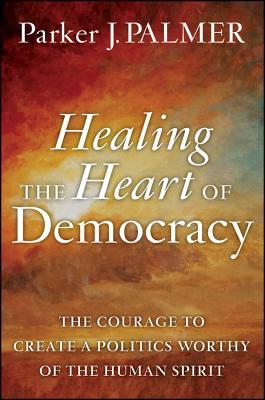 Healing the Heart of Democracy: The Courage to Create a Politics Worthy of the Human Spirit Parker Palmer (Jossey-Bass) $17.95 I suspect that after the election this week there is going to be significant backlash, anger, frustration, and deep disappointment among many (no matter who wins.) This book might help us navigate some of this calmly, with a bold proposal for meeting in small groups, talking together about our deepest fears and values, working locally to repair hurts and build bridges. Palmer knows much about listening well, about gentle approaches, about conflict and healing and hope. He’s a liberal Quaker, bringing those particular sensitivities to this vital quest and he has written much over his career about such things. (An early book on renewal in public life was called In the Company of Strangers.)
Healing the Heart of Democracy: The Courage to Create a Politics Worthy of the Human Spirit Parker Palmer (Jossey-Bass) $17.95 I suspect that after the election this week there is going to be significant backlash, anger, frustration, and deep disappointment among many (no matter who wins.) This book might help us navigate some of this calmly, with a bold proposal for meeting in small groups, talking together about our deepest fears and values, working locally to repair hurts and build bridges. Palmer knows much about listening well, about gentle approaches, about conflict and healing and hope. He’s a liberal Quaker, bringing those particular sensitivities to this vital quest and he has written much over his career about such things. (An early book on renewal in public life was called In the Company of Strangers.)
The introductory prelude to this moving, thoughtful book is called “A Politics of the Brokenhearted.” Enough said.
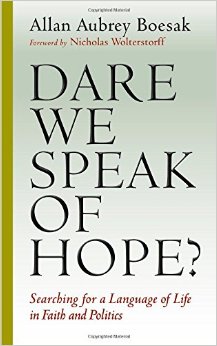 Dare We Speak of Hope? Searching for a Language of Life in Faith and Politics Allan Boesak (Eerdmans) $18.00 I wonder if you saw on my personal facebook page yesterday the PC(USA) video about the Belhar Confession, a Dutch Reformed theological document written in Belhar South Africa decades ago that is now an official part of the Presbyterian Book of Confession? I followed it with a link to a lecture Boesak gave on Belhar; he was a leader in the Christian prophetic denunciation of apartheid in South Africa and, along with Desmond Tutu and the martyred Stephen Biko, one of the most powerful activist and leaders and thinkers for the dismantling of apartheid. Here, Boesak brings his theological insight to bear on the more general question of faith and social change, how to speak about God’s reign of justice as it relates to political organization, and — yes — if it makes sense to speak of hope in this fallen, unjust world where shalom is routinely vandalized. It is eloquent. Nicholas Wolterstorff says in the foreword that it is “challenging, a deeply spiritual book.” Curtis Paul DeYoung of Bethel University calls in a “masterpiece.” Boesak holds the Desmond Tute Chair for Peace, Global Justice, and Reconciliation Studies, a joint position at Butler University and Christian Theological Seminary in Indianapolis.
Dare We Speak of Hope? Searching for a Language of Life in Faith and Politics Allan Boesak (Eerdmans) $18.00 I wonder if you saw on my personal facebook page yesterday the PC(USA) video about the Belhar Confession, a Dutch Reformed theological document written in Belhar South Africa decades ago that is now an official part of the Presbyterian Book of Confession? I followed it with a link to a lecture Boesak gave on Belhar; he was a leader in the Christian prophetic denunciation of apartheid in South Africa and, along with Desmond Tutu and the martyred Stephen Biko, one of the most powerful activist and leaders and thinkers for the dismantling of apartheid. Here, Boesak brings his theological insight to bear on the more general question of faith and social change, how to speak about God’s reign of justice as it relates to political organization, and — yes — if it makes sense to speak of hope in this fallen, unjust world where shalom is routinely vandalized. It is eloquent. Nicholas Wolterstorff says in the foreword that it is “challenging, a deeply spiritual book.” Curtis Paul DeYoung of Bethel University calls in a “masterpiece.” Boesak holds the Desmond Tute Chair for Peace, Global Justice, and Reconciliation Studies, a joint position at Butler University and Christian Theological Seminary in Indianapolis.
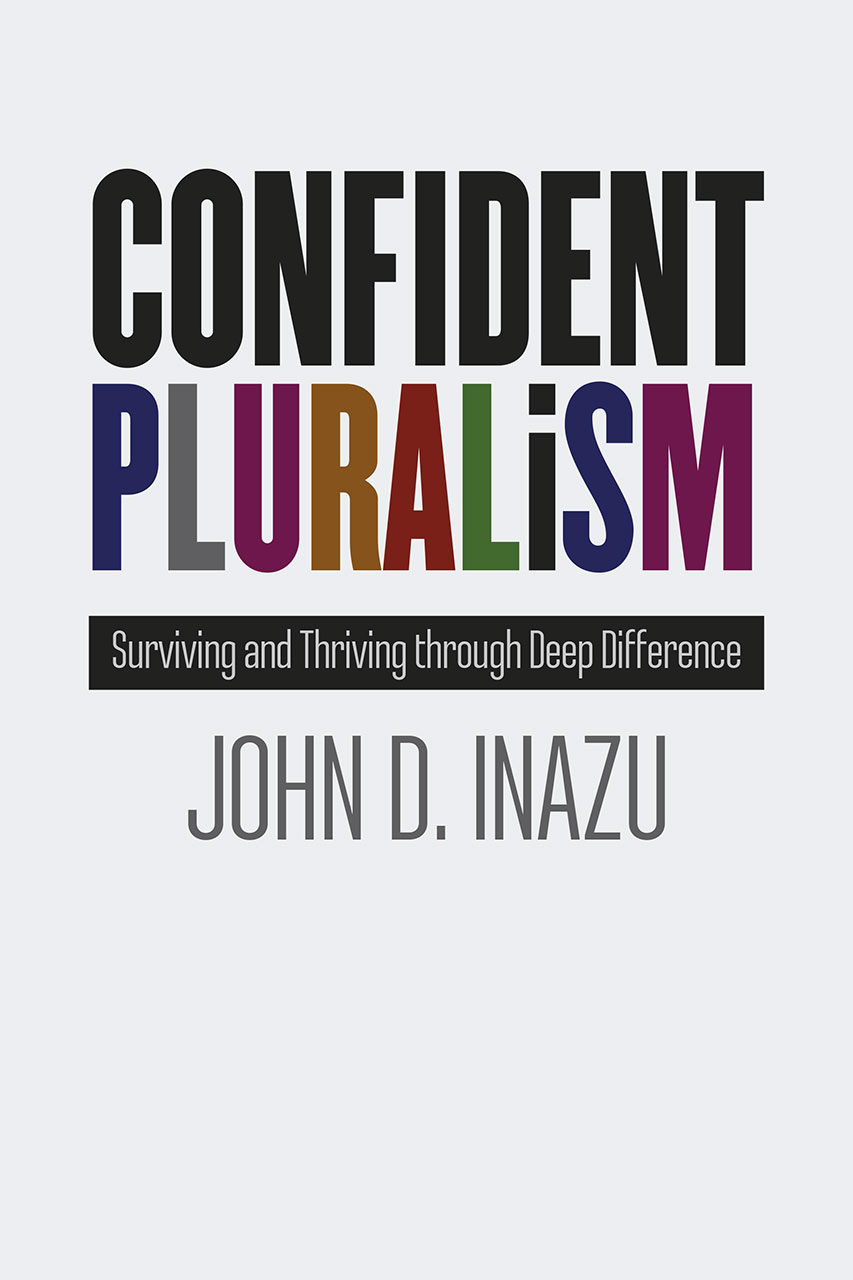 Confident Pluralism: Surviving and Thriving Through Deep Difference John D. Inazu (University of Chicago Press) $29.00 Although published by the prestigious and scholarly University of Chicago, this Christian law prof’s book is winsome, upbeat, thoughtful — of course — but practical. Perhaps you saw him in his delightful conversation just a few weeks ago (which was streamed lived) with New York Times columnist Nicholas Kristoff and Redeemer Presbyterian pastor and author Timothy Keller, moderated by the Center for Public Justice’s Stephanie Summers. Pluralism is, Inazu reminds us, one of the founding creeds of our United States, with the famous motto E pluribus unum emblazoned on the Great Seal.
Confident Pluralism: Surviving and Thriving Through Deep Difference John D. Inazu (University of Chicago Press) $29.00 Although published by the prestigious and scholarly University of Chicago, this Christian law prof’s book is winsome, upbeat, thoughtful — of course — but practical. Perhaps you saw him in his delightful conversation just a few weeks ago (which was streamed lived) with New York Times columnist Nicholas Kristoff and Redeemer Presbyterian pastor and author Timothy Keller, moderated by the Center for Public Justice’s Stephanie Summers. Pluralism is, Inazu reminds us, one of the founding creeds of our United States, with the famous motto E pluribus unum emblazoned on the Great Seal.
Here is how the publisher describes the project of this very important book:
Yet free, liberal American society still faces certain structural problems in accommodating cultural anxieties, minority views, and significant heterodoxies. John D. Inazu takes stock of this ongoing problem and offers a theory of American jurisprudence that is intended to advance progress toward a formal legal regime that generally invites tolerance, humility, and patient persuasion. Inazu believes that members of our society can and must live together peaceably in spite of deep and irresolvable differences in our beliefs, values, identities, and groups. Written by the leading authority on the First Amendment, Confident Pluralism: Surviving and Thriving Through Deep Difference invites people to have the courage in their convictions, to assume a confidence built on security and comfort, and to avoid civic engagements built on anxiety and chauvinism.
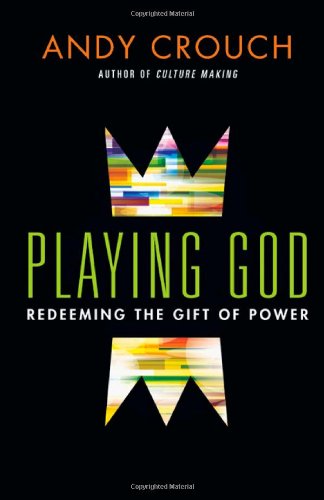 Playing God: Redeeming the Gift of Power Andy Crouch (IVP) $25.00 I know you know that I love this author and love this book. I kept thinking it didn’t fit on this list, but I kept sensing I was to list it. It does seem that much of our current malaise does, in some ways, relate to our deep anxiety about the use of power. Is power necessarily bad? How is it abused, and what are we to do? How much perversion of power might be expected in a fallen world, and what might we do to redeem it? How are institutions — governments, obviously, but other socially formative institutions — to be seen in God’s world, and how might we relate to authority, healthy or deformed? I am on the lookout for more books on this topic, and maybe others will write with different postures or tones or insight.
Playing God: Redeeming the Gift of Power Andy Crouch (IVP) $25.00 I know you know that I love this author and love this book. I kept thinking it didn’t fit on this list, but I kept sensing I was to list it. It does seem that much of our current malaise does, in some ways, relate to our deep anxiety about the use of power. Is power necessarily bad? How is it abused, and what are we to do? How much perversion of power might be expected in a fallen world, and what might we do to redeem it? How are institutions — governments, obviously, but other socially formative institutions — to be seen in God’s world, and how might we relate to authority, healthy or deformed? I am on the lookout for more books on this topic, and maybe others will write with different postures or tones or insight.
For now, this splendidly interesting book is simply indispensable, one of the best treatments of the subject to date. I think it would be wise to know this stuff well, and to ponder it together with others.
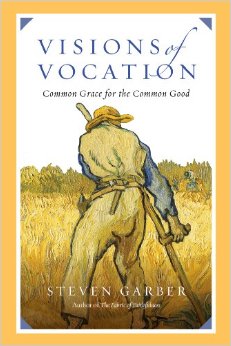 Visions of Vocation: Common Grace for the Common Good Steven Garber (IVP) $17.00 I got to be with Steve again last week and we had too short conversations and I heard him give two great presentations. I am reminded again and again when I am with him what a great person of integrity he is, settling for no cheap solutions, no easy answers, holding up “broken Hallelujahs” as this fallen world is, in fact, the only world we’ve got. Things are not as they are meant to be, we know, and God’s gracious Kingdom is, if “already” certainly also, also, also, “not yet.” We are between times of Christ’s victory and the long wait of Kingdom come. So, we need visions of vocation to help us keep on, to stay at our posts, to do what we are called to do with hope and good humor. In Steve’s eloquent book, he richly reminds us of the value of “making peace with proximate justice” as a practice and virtue to keep us from chronic disappointment. It is a good world, after all, broken and sad, but full of covenant promise and great beauty.
Visions of Vocation: Common Grace for the Common Good Steven Garber (IVP) $17.00 I got to be with Steve again last week and we had too short conversations and I heard him give two great presentations. I am reminded again and again when I am with him what a great person of integrity he is, settling for no cheap solutions, no easy answers, holding up “broken Hallelujahs” as this fallen world is, in fact, the only world we’ve got. Things are not as they are meant to be, we know, and God’s gracious Kingdom is, if “already” certainly also, also, also, “not yet.” We are between times of Christ’s victory and the long wait of Kingdom come. So, we need visions of vocation to help us keep on, to stay at our posts, to do what we are called to do with hope and good humor. In Steve’s eloquent book, he richly reminds us of the value of “making peace with proximate justice” as a practice and virtue to keep us from chronic disappointment. It is a good world, after all, broken and sad, but full of covenant promise and great beauty.
And — this is important — it is also full of great folks doing great stuff in many corners of the world. Steve has a way of telling of lovely work going on, not necessarily heroic or grand, but small things done with great love — common grace for the common good, in business, the arts, education, neighborhoods, banking, politics, in families and in various spheres of society. These great stories will inspire you as many are pretty cool and his networks of influence will impress you; after reading or re-reading Visions of Vocation you will want to take up your own calling to care more deeply, even as we know just how messed up everything is. Can we love the world as God does, broken as it may be? Can we learn to say that to a watching world that doesn’t understand our theology and spiritual rhetoric? Can we translate the Biblical story of creation – fall – redemption and the promise of restoration into ways of living that capture the imagination of others? This is a book that is unlike any I’ve read and needed now more than ever. If you’ve read it recently, why not order Garber’s first one, similarly deep and profound and beautiful, Fabric of Faithfulness: Weaving Together Belief and Behavior (IVP; $18.00) which ponders the ethics of knowing, the responsibility of action, and the things we must do if our faith is going to be sustainable over the whole of life, for the rest of life.
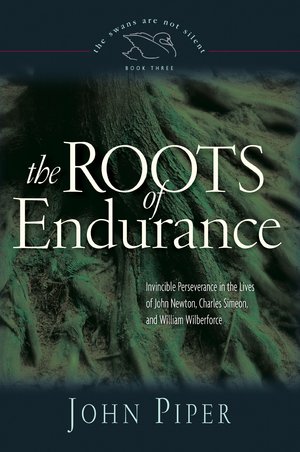 The Roots of Endurance: Invincible Perseverance in the Lives of John Newton, Charles Simeon, and William Wilberforce John Piper (Crossway) $16.99 This third installment in the large, on-going “The Swans Are Not Silent” series offers three short biographies of three long-suffering men of God who endured great trials and yet stayed faithful to their posts. That they resisted bitterness even though they faced years of persecution or failure in their campaigns for renewal and social justice is inspiring and the stories of their “long obedience in the same direction” deserves to be known. These three mini-biographies remind us that we are not the first to wonder how we can endure and persevere, not the first to feel things coming undone, not the first to be tempted to despair. This whole series is good, but this one offers glimpses into three remarkable Kingdom servants who kept hope alive, despite all. Wow.
The Roots of Endurance: Invincible Perseverance in the Lives of John Newton, Charles Simeon, and William Wilberforce John Piper (Crossway) $16.99 This third installment in the large, on-going “The Swans Are Not Silent” series offers three short biographies of three long-suffering men of God who endured great trials and yet stayed faithful to their posts. That they resisted bitterness even though they faced years of persecution or failure in their campaigns for renewal and social justice is inspiring and the stories of their “long obedience in the same direction” deserves to be known. These three mini-biographies remind us that we are not the first to wonder how we can endure and persevere, not the first to feel things coming undone, not the first to be tempted to despair. This whole series is good, but this one offers glimpses into three remarkable Kingdom servants who kept hope alive, despite all. Wow.
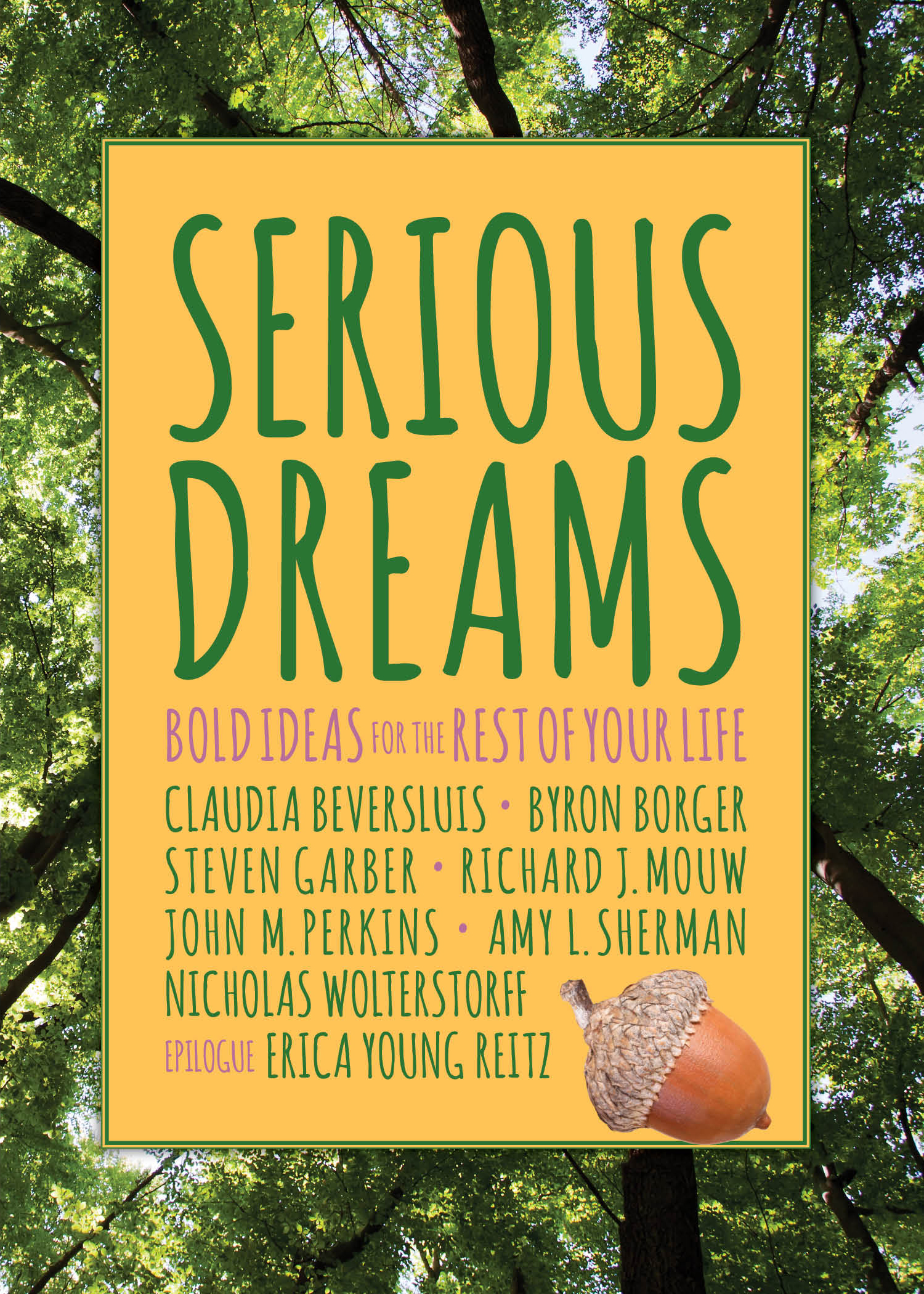 Serious Dreams: Bold Ideas for the Rest of Your Life edited by Byron Borger (Square Halo Press) $13.99 I haven’t touted this much lately and it is a tiny bit awkward since it is my own book. My book as an answer to your deep post-election depression and as balm for our dangerous times in late 2016? Yep. I re-read all of these chapters again, recently (except by own, actually, on being sons and daughters of Issachar) and it dawned on me that what others have said is true — this is not just for college graduates, although each of these pieces were first given as commencement speeches. These lively chapters (and the reflection questions after each) really are invitations to make a difference in the world, to take up callings and careers with renewed vigor, to care about the common good, to draw on the past and what we’ve learned and come to believe and apply it afresh in our needy, broken world. Some of our finest evangelical thinkers and authors contributed to this small, handsome book, and I am honored to again remind you of the great little chapters by Richard Mouw, John M. Perkins, Claudia Beversluis (who draws on a Wendell Berry poem), Nicholas Wolterstorff, Amy L. Sherman, Steve Garber, me, and a nice afterword by Erica Young Reitz, author of After College.
Serious Dreams: Bold Ideas for the Rest of Your Life edited by Byron Borger (Square Halo Press) $13.99 I haven’t touted this much lately and it is a tiny bit awkward since it is my own book. My book as an answer to your deep post-election depression and as balm for our dangerous times in late 2016? Yep. I re-read all of these chapters again, recently (except by own, actually, on being sons and daughters of Issachar) and it dawned on me that what others have said is true — this is not just for college graduates, although each of these pieces were first given as commencement speeches. These lively chapters (and the reflection questions after each) really are invitations to make a difference in the world, to take up callings and careers with renewed vigor, to care about the common good, to draw on the past and what we’ve learned and come to believe and apply it afresh in our needy, broken world. Some of our finest evangelical thinkers and authors contributed to this small, handsome book, and I am honored to again remind you of the great little chapters by Richard Mouw, John M. Perkins, Claudia Beversluis (who draws on a Wendell Berry poem), Nicholas Wolterstorff, Amy L. Sherman, Steve Garber, me, and a nice afterword by Erica Young Reitz, author of After College.
Yes, the primary, intended audience that we had in mind in doing Serious Dreams was young adults who need encouragement to live out their faith in robust, meaningful ways as agents of God’s shalom in all of life, especially their careers and other callings. It’s a great college graduation gift. But others have read it and exclaimed how interesting these chapters were, how nice to dip into the words and grace and wisdom of these renowned leaders, and, well, I concur. I hate to sound proud or pushy but in dark times we need good messages to keep us going, we need good words, bread for the journey, and you will find them here. Some of these lovely speeches are well worth visiting and re-visiting; they each have a certain confident passion about them that seems especially important these days. God is good, and we are called to good work. This reminds us of gospel transformation and Kingdom visions. I called them serious dreams. Maybe now more than ever we need such reminders.
BookNotes
DISCOUNT
ANY ITEM MENTIONED
10% off
order here
takes you to the secure Hearts & Minds order form page
just tell us what you want
inquire here
if you have questions or need more information
just ask us what you want to know
Hearts & Minds 234 East Main Street Dallastown, PA 17313 717-246-333
